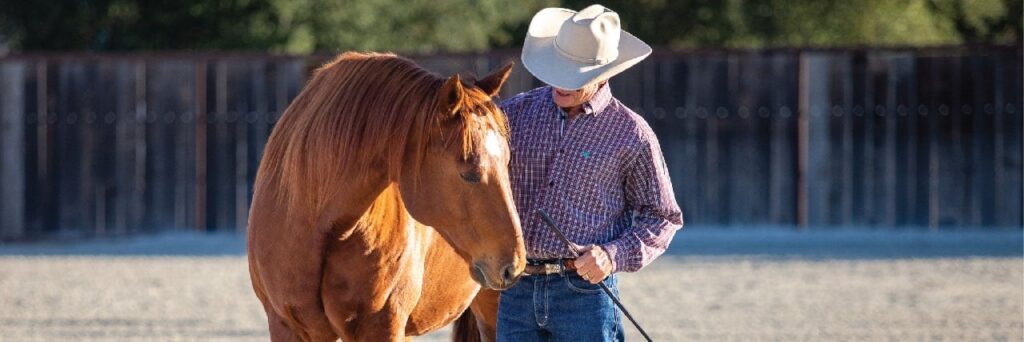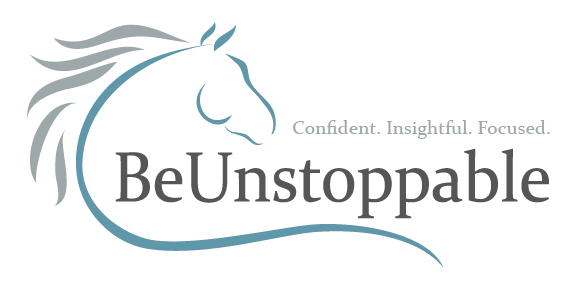It’s not a Method, it’s a Mindset.
My point isn’t to criticize methods and their use, but to emphasize the importance of using the correct mindset when training horses.
The most common questions I receive are often based on very similar scenarios. Most people ignore the first 10 problems their horse communicates to them, but they are only interested in resolving the 11th problem.
It’s kinda like saying: “My child is failing the 11th grade. I need help, what do I do? Oh by the way he also failed the 1st, 2nd, 3rd, 4th, 5th, 6th, 7th, 8th, 9th and 10th grades.”
What it sounds like in horse terms is: “My horse paws and rears when tied up. He won’t stand still when I saddle him. Anyway, he is rushy at the canter. How do I fix the rushy canter?”
All mammals’ sense of safety comes from attunement, as UCLA professor of psychology Daniel Siegel refers to as “being seen and being heard.” Trauma therapist Sarah Schlote has taken one step further and said that it’s the sense of being seen, being heard, feeling felt, and getting gotten.
Ignoring the first 10 pieces of crucial information from your horse (paws and rears when tied up, won’t stand for saddling) and instead trying to fix the 11th problem (rushy canter) is not only a terrible way to train horses, but it also communicates a lack of attunement. You are saying to your horse, through your inaction and lack of awareness “I did not see those first 10 attempts to communicate your concerns.”
When you ignore the little things because you have a goal in mind (flying lead change, trail ride, etc.) it’s easy to run into big problems and then believe that you aren’t good enough. No horse is too much horse for you, IF you can choose to do things you can succeed at. This is where it becomes a mindset, not a method.
If you’re a subscriber and have watched the 3-Part series called Working With A Pushy, Anxious Warmblood, in Part 1 I simply had the owner stand on the other side of the fence from her horse for an hour or so. Trying to do more than that would have become problematic and she wouldn’t have been able to succeed. She would then tell herself that she is over-horsed or that she doesn’t measure up, or any of the other limiting beliefs we have.
The series goes on to show how a change in your mindset will allow you to constantly have small wins with your horse training.
Being successful at this work all comes down to your mindset, whether it’s choosing to work on what you’re good at or being present enough to notice the little things that go wrong and then persisting until they’re resolved.
In most of my replies to questions, I’m not giving advice to solve the problems, I’m trying to change the mindset that is causing the problem in the first place.
Before you try to learn a new exercise with your horse, take a moment to reflect on where your mindset is, and where you want it to be.
Journey On,
Warwick


Your point of view caught my eye and was very interesting. Thanks. I have a question for you.
I don’t think the title of your article matches the content lol. Just kidding, mainly because I had some doubts after reading the article.
I don’t think the title of your article matches the content lol. Just kidding, mainly because I had some doubts after reading the article.
I don’t think the title of your article matches the content lol. Just kidding, mainly because I had some doubts after reading the article.
Thank you for your sharing. I am worried that I lack creative ideas. It is your article that makes me full of hope. Thank you. But, I have a question, can you help me?
Wow, amazing blog format! How lengthy have you ever been blogging for? you made running a blog look easy. The overall glance of your website is great, as neatly as the content!
https://main7.top/
Can you be more specific about the content of your article? After reading it, I still have some doubts. Hope you can help me.
Hi i think that i saw you visited my web site thus i came to Return the favore Im attempting to find things to enhance my siteI suppose its ok to use a few of your ideas
https://goodgame.kz/communication/forum/user/102363/
http://www.tamboff.ru/forum/viewtopic.php?p=7690694#7690694
http://business-media.info/forum/messages/forum1/topic869/message3771/?result=new#message3771
https://aktivnoe.forum24.ru/?1-7-0-00009968-000-0-0-1706616000
http://pervak.ukrbb.net/viewtopic.php?f=13&t=20440
https://pediascape.science/wiki/Mp3bit.pw_2
https://zarabotok.forumrpg.ru/viewtopic.php?id=69098#p150423
https://dress-deluxe.com/forum/?PAGE_NAME=profile_view&UID=23029
http://kvitka.ukrbb.net/viewtopic.php?f=37&t=18727
http://cars.teamforum.ru/viewtopic.php?f=2&t=1354
http://alphard.flybb.ru/viewtopic.php?f=16&t=2268
https://wiki.bailey.wiki/w/Mp3bit.pw_3
https://gelen.webtalk.ru/viewtopic.php?id=247#p363
https://chelyabinsk.eurooptic.ru/about/forum/user/16031/
http://artem-energo.ru/forums.php?m=posts&q=16012&n=last#bottom
https://animeworld.ruhelp.com/viewtopic.php?id=8266#p33606
https://fisketavling.nu/cb-profile/pluginclass/cbblogs?action=blogs&func=show&id=84
https://wiki.resilience-transition.fr/index.php?title=Utilisateur:KandyJay8619348
https://mskforum.8bb.ru/viewtopic.php?id=10333#p24273
https://able.extralifestudios.com/wiki/index.php/User:JanellRumble
http://www.diablomania.ru/forum/showthread.php?t=432376
http://tr74.ru/viewtopic.php?f=20&t=4174
http://www.zdravamir.ru/index.php?option=com_myblog&show=n-n-n-n-n-n-n-mp3.html&Itemid=
http://forum.jeep-club.by/index.php?/blog/16/entry-2028-найти-новинки-музыки-2024-года-можно-на-сайте-mp3bit/
https://owlpedia.org/index.php/User:DorisPsx78679129
http://little-witch.ru/viewtopic.php?f=25&t=5982
http://mypenza.ru/forum/index.php?showtopic=61357
http://woman.build2.ru/viewtopic.php?id=11979#p39169
http://wiki.rl-transport.org/index.php/Mp3bit.pw
http://detimgn.iboards.ru/viewtopic.php?f=50&t=32220
http://www.uyskiy.ru/forum/topic.php?forum=2&topic=10256
The Beatles – легендарная британская рок-группа, сформированная в 1960 году в Ливерпуле. Их музыка стала символом эпохи и оказала огромное влияние на мировую культуру. Среди их лучших песен: “Hey Jude”, “Let It Be”, “Yesterday”, “Come Together”, “Here Comes the Sun”, “A Day in the Life”, “Something”, “Eleanor Rigby” и многие другие. Их творчество отличается мелодичностью, глубиной текстов и экспериментами в звуке, что сделало их одной из самых влиятельных групп в истории музыки. Музыка 2024 года слушать онлайн и скачать бесплатно mp3.
cialis quick ship
cialis quick ship